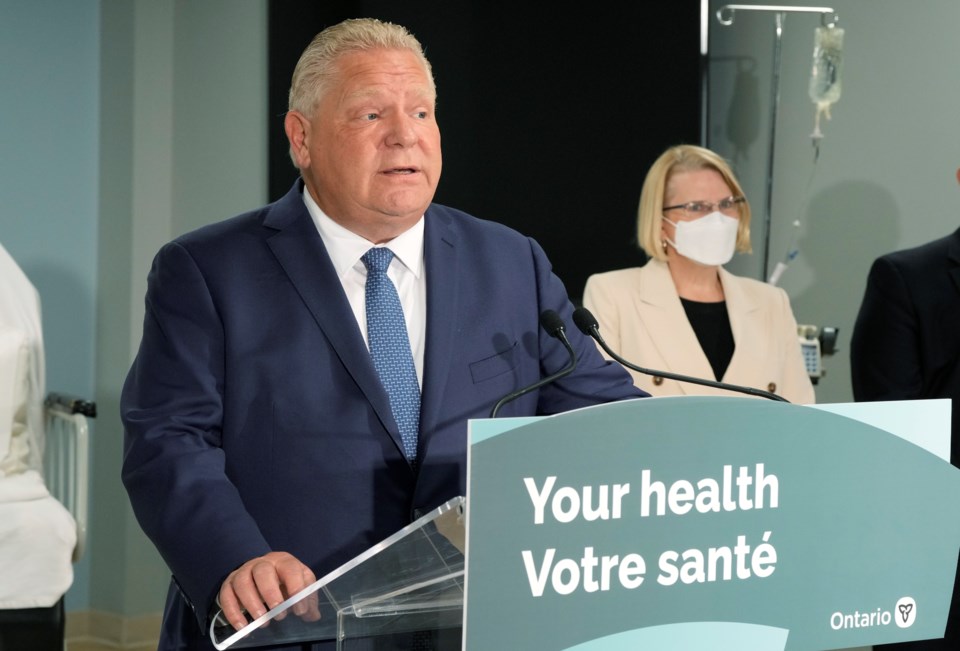"Expand harm reduction services" was Jill Campbell's first recommendation.
Appointed by the Ford government to supervise and report on a controversial Toronto consumption and treatment site, the former CAMH executive came away from her time at the health centre convinced of its importance.
Four months later, Health Minister Sylvia Jones announced she would do the opposite — shutting down 10 consumption and treatment services (CTS) centres across Ontario and banning future sites, as well as safer supply programs and needle exchanges.
There were 290 suspected drug-related deaths — nine per day — in Ontario last month, according to the province's chief coroner.
Campbell was appointed to oversee the South Riverdale Community Health Centre in Toronto after Karolina Huebner-Makurat was killed by a stray bullet fired near the site, following escalating concerns from nearby residents.
In her April report, released Monday, Campbell writes tenderly about the site's clients.
She noted the contrast between the affluent area and visible poverty when she went to get a coffee with a staffer, walking on sidewalks packed with young parents and strollers. She noted that the cafe didn't take cash.
"Fortunately, the staff member had brought a credit card, but the Supervisor reflected on the marginalized individuals that still lived in this community that would not have access to a banking card to purchase a cup of coffee," she wrote.
Campbell noted how a simple change could nullify certain concerns from the surrounding community.
The CTS is open from 8 a.m., but the Centre doesn't open to other clients until 9 a.m., she wrote. People looking to use the health centre's non-CTS services would wait outside on the sidewalk, giving "false impressions to the community that these were CTS clients 'loitering' outside the building."
She started allowing everyone into the building starting at 8 a.m., noting "improvements to community perceptions."
Under the Ford government's new directive, CTS sites that won't face closure will have to create anti-loitering policies.
At the same time, Campbell wrote that the sites' workers could be too focused on their clientele and not enough on their other neighbours.
"When the supervisor asked how the respondent defined community, the answer was often 'drug users' or 'clients', thus demonstrating that the primary focus was on the service-user needs, but not on the neighbours as community and how services may impact them," she wrote.
Campbell made 11 recommendations, including expanding harm reduction services like CTS sites and safer opioid supply programs, to prevent deaths. She also called on the province to increase funding for mental health supports, and make those a mandatory part of CTS sites — and to increase the number of treatment beds and other treatment options.
Instead of shuttering sites within 200 metres of schools, Campbell called for increased security for those locations. And staff should sweep for needles in a wider area than they currently do, she wrote.
Some of Campbell's recommendations did make their way into government policy — sort of.
She proposed a "hub-and-spoke" model so people can get adequate care everywhere. The "hub" model aims to accomplish that, albeit without many of the supports Campbell called for.
She pushed for sites to annually evaluate how many people they serve and how much space they need, and for a yearly third-party assessment to see how the sites are complying with federal and provincial rules.
Remaining CTSs will be faced with increased reporting requirements, but the government frames it as a way to keep them in line — "to enable greater ministry oversight of any safety and security concerns," as the news release puts it.
At the end of her report, Campbell quoted Mahatma Gandhi: "'A nation’s greatness is measured by how it treats its weakest members.'
"South Riverdale CHC was established to serve the weak and underserved, and should continue to do so," she wrote, "not in isolation, but in collaboration and engagement with its partners and surrounding community."
Campbell's report wasn't the only one commissioned by the government about the south Riverdale site.
In a February report (also released on Monday), Unity Health also "found a clear need for the services" at the site. Consumption sites should be located in community health centres due to the wide range of services they provide, it said.
Clients are able to access "low-barrier, walk-in access to substance use and addictions counselling, treatment including opioid agonist therapy, medications for withdrawal, referrals, and resources," as well as "immediate counselling or mental health crisis support," Unity wrote.
A registered nurse is on site for primary care, as well as employment support, referrals to external services, and "nutritious snacks and coffee."
Unity also called for more security, collaboration with local police, and de-escalation training for staff — but said that could require more funding.
"The review team recommends that the Ministry of Health allow CTS sites more flexibility in how they use funds. The review team recognizes that the implementation of some of the recommendations in this report may require additional resources that SRCHC does not currently have," it wrote.
At a press conference on Wednesday afternoon, a CBC reporter asked Premier Doug Ford why his government had gone against the expert advice in the reports.
"I was just wondering how you would feel if I stuck one of these beside your house," he replied. "You wouldn't like it. Matter of fact, I know you wouldn't like it. Neither would your neighbours, and neither would anyone else and all the kids — they shouldn't be by schools, they shouldn't be by daycares."
He reiterated that his government is going to spend $378 million on creating 19 "Homelessness and Addiction Recovery Treatment (HART) hubs," including where CTS sites will be closed.
"And in Leslieville — endless, endless calls non-stop on my cellphone about, 'Thank you for doing this,'" he added.




